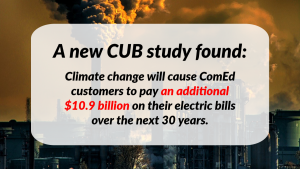Climate change will cause ComEd customers to pay an additional $10.9 billion on their electric bills over the next 30 years, a new CUB study shows.
The research proves a point that CUB has long made: Climate change is bad for consumers’ bottom lines. It also underscores the importance of Illinois passing strong clean energy legislation in Springfield.
The study, “The Impact of Climate Change on Future ComEd Electricity Demand and Costs,” reveals that by 2050, a heightened demand for cooling as a result of warmer summers will cause customers of Illinois’ largest electric utility to use 3.9 Terawatt-hours more electricity. 
Under conservative price projections, ComEd customers will pay an additional $10.9 billion (in 2018 dollars) over the next three decades. Climate change will hit residential customers the hardest: The average cost increase for residential customers would be 7.7 percent, compared to 3 percent for the non-residential class, according to the study.
“Our findings show that the rising temperatures caused by unchecked climate change will be devastating for Illinois consumers and their electric bills,” Jeff Zethmayr, CUB’s Director of Research, said. “Our work demonstrates the urgent need for clean energy legislation—not addressing climate change is devastating to the planet and our health, and it’s bad for our wallets, too.”
Using historical local weather data and newly-available anonymous usage data for residential customers in the ComEd service territory, CUB’s research team estimated average daily usage for residential customers through the end of 2050. Zethmayr and CUB Data Scientist Ramandeep Makhija used numbers from the International Panel on Climate Change to project annual temperature increases over the next three decades.
In this first-of-its-kind study, the report isolates the effect of anticipated temperature and humidity increases on energy consumption in northern Illinois households, holding other weather variables constant. Many energy usage forecasts assume no change in weather patterns, which is imprecise in an era of climate change.
Passing consumer-friendly clean energy legislation is necessary. That’s why CUB and consumer, labor and environmental advocates from up and down the state are working right now in Springfield to pass an energy bill that would protect our planet, our communities and our bills.

